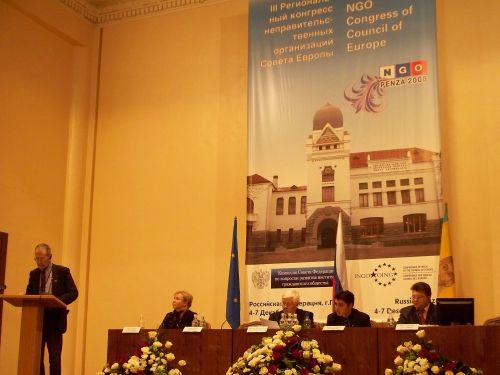The Congress, which was held in Penza, south-east of Moscow, from 4 to 7 December, was organized as a series of discussions on the role of NGOs in the development and consolidation of democracy, in the development of civil society, on current issues of international cooperation, and on opportunities and perspectives of regional cooperation. The follow-up of the Congress included preparation of resolutions and recommendations on the most important problems of NGOs’ activities and mechanisms of their interaction with the Council of Europe (CofE) institutes.
One of the main topics of the Congress was the discussion of the European Code of civil participation. The principal idea of the code is to make the job of NGOs in the CofE Member States and Belarus easier and more effective by means of developing a set of general principles, guidelines, tools and mechanisms for civil participation in decision-making processes. For this to happen, though, the code will have to be implemented at both local and national levels. The code is based on actual experiences from NGOs and civil society organizations across Europe who shared their good practices and the most effective methods of interaction with the authorities. Within the Congress the discussion touched upon three key themes: participation of NGOs in the development of cross-cultural communication, challenges and perspectives of mass media and the civil society interaction, and legislation on NGOs and law-enforcement practices.
250 people, of which 50 % came travelling from abroad, took part in the event. In addition to the delegates from the Russian Federation, Belarus, the Baltic countries, Poland and Ukraine, there were representatives of European international NGOs, CofE, international experts, and the media.
At the same time, some leading Russian NGOs ignored the Congress, accusing the CofE of arranging the event entirely in accordance with the preferences of Russian official authorities and not taking into account the input of some NGOs regarding the conference agenda. These NGOs have already suggested that an alternative congress should take place, in agreement with their views on the situation.
Nevertheless, both Valentina Melnikova, Chairwoman of the Board of the Russian Human Rights Center and Liubov Vinogradova, a member of the same board, took part in the Congress. They agree that «the event was useful and effective. It contributed to reconstruction of connections and contacts with NGOs from post-Soviet states, and helped them compare each other’s activities from a multicultural perspective. In addition, the event served as an opportunity to share some good practices». At the same time, both regretted that some organizations disregarded the Congress, and in doing so deprived themselves of the opportunity to express their opinion on the most pressing questions of the day. Likewise, they deprived the Russian Federation of the opportunity to present the whole variety of NGOS to foreign partners.


